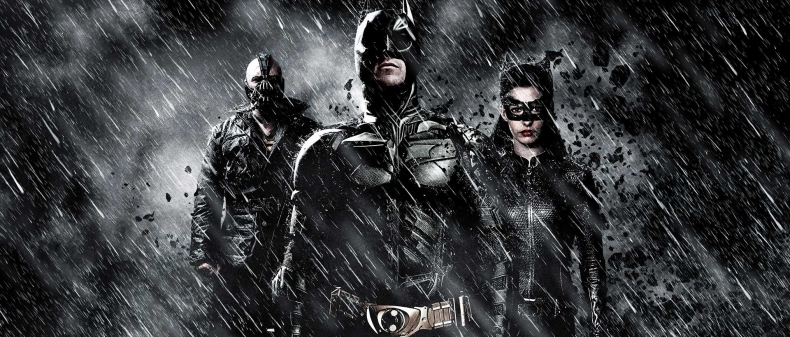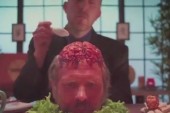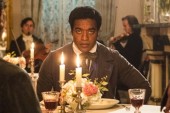
It can be fun writing a pan, especially when the movie in question is inane Hollywood schlock or some wildly overpraised critics’ darling. But it’s not so fun panning movies that large swaths of people love, which is why I’ve been dragging my feet on The Dark Knight Rises. It isn’t just that I disliked the film, it’s that I find the whole series a solemn drag built on bogus intellectual pretensions–pulp masquerading as art. And the breathless critical hosannas just make things worse, providing audiences an excuse to avoid anything more worthwhile. If The Dark Knight Rises can be deemed serious cultural commentary and an American masterpiece–that’s what Time and many other media outlets are calling it–who needs a Godfather, Part 2 or an L.A. Confidential or a There Will Be Blood? The Batman films don’t represent the maturation of comic-book movies, they represent the regression of adult tastes and expectations; they encourage us to keep swimming in the shallows with the kids.
To clarify, I’m not some knee-jerk hater of superheroes or comic books. I grew up reading Frank Miller’s The Dark Knight, Alan Moore’s The Killing Joke, and Grant Morrison’s Arkham Asylum, and I still love the Batman universe, but part of getting older is realizing that superheroes belong, inescapably, to a black-and-white moral universe. The director of The Dark Knight Rises, Christopher Nolan, can slather on all the grim seriousness he wants, and he can have his characters pose ponderous moral questions ’til the cows come home, but he can’t change the fact that Batman–who can drop a thug from a six-story rooftop and know with certainty he’ll survive, or outrun cops in the Batmobile without worrying about killing innocent bystanders–makes no sense as a moral being. As a vehicle for pondering morality, superheroes–impossibly powerful, infallibly good–are maybe the most inappropriate protagonists imaginable.
Nolan and his fans want the kick of slam-bang action and the complexity of grown-up drama simultaneously, and in order to get it they pretend the two modes can be reconciled. But what we end up with is just nonsensical. Much has been made already of the film’s parallels to the Occupy Wall Street movement, with Thomas Hardy’s villainous Bane blathering on about class warfare and revolution ad nauseum. But how can we take anything he says even halfway seriously when his accompanying actions are so utterly simplistic? Bane’s approach to redressing financial iniquity is to invade Wall Street and set off some bombs. Later, he goes about amassing a personal army by opening all of Gotham’s prison gates, whereupon the prisoners just automatically join him. This is what the Batman movies provide: an opportunity for viewers to pretend they’re grappling with serious, real-world issues without having to leave their make-believe adolescent cocoons. Sadly, this seems to be what a lot of us want nowadays, and not just from movies but from life–to be kids and grown-ups simultaneously, to remain forever in-between. (See what I mean? I feel like a killjoy already.)
I’m not saying we can’t continue to enjoy superheroes as adults, just that we shouldn’t look to them for philosophical or emotional sustenance. A good contrast to Nolan’s vision is the ’90s-era Batman: The Animated Series, which, though for kids, was maybe the sharpest interpretation of the character to date. I watched it as an adult and loved it. The show was notably dark, moody, and sophisticated–one look at that chiaroscuro, art deco title sequence was enough to impress anyone–but it always stayed firmly within the realm of simple, primary-colour fantasy, complete with comically exaggerated villains and cartoon violence. Whatever moral questions it posed were primer-level ones, and kids and adults alike could engage with it on that level. (The same could be said of Richard Donner’s Superman and Tim Burton’s Batman movies.) It didn’t ask us, as Nolan’s movies do, to ruminate on the abuses of capitalism or the rights of the individual versus the rights of society.
I don’t know what to say to people who think Nolan’s Philosophy 101 material elevates the series to higher intellectual plains. It’s embarrassing blather–the mark of a filmmaker who doesn’t know where the line sits between intelligence and pomposity. I spent the bulk of the first film, Batman Begins, wincing at all the ponderosities: “Your anger gives you great power, but if you let it, it will destroy you”; “To conquer fear you must become fear”; “You care about justice? Look beyond your own pain, Bruce”; etc. Incredibly, The Dark Knight Rises manages to be even more heavy-handed, with Michael Caine’s Alfred, Gary Oldman’s Commissioner Gordon, and all the other characters speechifying at Christian Bale’s Bruce Wayne every chance they get. I’m all for genre movies going beyond mindless thrills, but it used to be that genre filmmakers would look for depth sub-textually, not right out on the surface in on-the-nose dialogue. Even the much-maligned Fantastic Four had a better sense of wordless shorthand–the stock-in-trade of comic-book art–than the Batman movies do. I still remember the moment when the Thing, rejected by his wife, went to pick up her tossed-aside wedding ring and discovered his stone hand was too big and clumsy to grasp it. As simplistic as it was, there was poetry in that image. If Nolan had made the movie, he’d have the Human Torch lecture the Thing about the call of duty and the personal sacrifices it demands.
You can say I’m taking a comic-book movie way too seriously, but I’m not taking it any more seriously than Nolan does. I mean, he actually presages a big CGI apocalypse at a football stadium with a boy soprano singing “The Star-Spangled Banner.” This is my ultimate problem with Nolan: his solemn high-mindedness begets–even demands–ours. And the media (me included) obliges with endless analyses of the movie’s messages and politics (“What The Dark Knight Rises Says About America”, etc). We’re legitimizing Nolan’s pretension, and we’ll have no one to blame but ourselves when boy sopranos start popping up in every mindless blockbuster.
____
Scott MacDonald writes about cinema for Toronto Standard.
For more, follow us on Twitter: @TorontoStandard and subscribe to our Newsletter.














